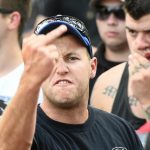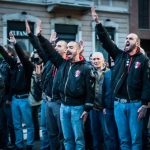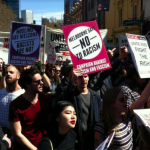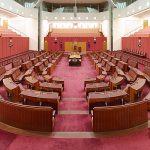The Far-Right’s Assault on LGBTIQ Communities

In another development in the current global shift to the far-right, the world’s fourth largest democracy Brazil elected extremely divisive presidential candidate Jair Bolsonaro to office on October 28.
And as seems to be part and parcel of the right-wing agenda, Bolsonaro’s campaign rhetoric was riddled with anti-LGBTIQ rhetoric, along with attacks on women, African Brazilians, Indigenous people and the poor.
Vilification of the LGBTIQ community is nothing new for Bolsonaro, who’s been a member of the nation’s congress for the last three decades. In 2013, he declared himself to be a proud homophobe. And he’s also said that he’d be incapable of loving a son who was gay.
But, while Bolsonaro is simply spouting hateful words, they do have an inciting effect on the ground. And since his popularity began increasing during his electoral campaign, so too did the violence being perpetrated against members of local LGBTIQ communities.
Over the ten day period ending 10 October, around 50 politically-motivated attacks had been carried out by Bolsonaro supporters, which were for the most part aimed at LGBTIQ people, according to the Publica Agencia for Investigative Journalism.
And these hate crimes – which included the stabbing deaths of three transgender women in separate incidents by men who called out Bolsonaro’s name – continued right up until his election. So, there are very real concerns as to what will transpire after he takes office on 1 January.
In the wake of Trump
Bolsonaro has been dubbed the Trump of the Tropics. And indeed, the current US president’s rise to office was similarly accompanied by an increase in violence targeting LGBTIQ people, along with attacks on Muslims, Latin Americans and African Americans.
Released in January, the annual Crisis of Hate report revealed that 2017 – Trump’s first year in office – marked the highest number of anti-LGBTIQ homicides in the United States since the National Coalition Of Anti-Violence Programs began monitoring the situation 20 years ago.
A total of 52 LGBTIQ people died as a result of hate motivated murders last year.
However, for the most part, the broader American community are unaware of this rise in violence as the media isn’t paying attention. A Media Matters analysis found that seven television news outlets spent less than forty minutes covering the rise in anti-LGBTIQ violence in 2017.
The Crisis of Hate report authors made clear that the document was being released at a time when LGBTIQ communities are witnessing the roll back of the “few civil rights protections and policies” that are in place and discrimination is being instituted into the law.
The attempt to erase transgender people
The New York Times reported in late October that it had obtained a memo from the US Department of Health and Human Services that revealed it was pushing for the establishment of a narrow legal definition of sex to be determined by genitalia at birth.
This definition would be inserted into Title IX: the federal civil rights law that bans gender discrimination in educational institutions. This would roll back Obama administration decisions that broadened sex to include gender identity and sexuality.
This more fluid definition means that federal civil rights laws in general now recognise transgender, gender non-conforming and intersex people and protect them against discrimination. The proposed biological sex definition would revoke this recognition and protection across federal civil rights laws.
This is only the latest move by the Trump administration to erode the rights of transgender people. In February last year, the US president sent out a letter revoking an Obama-era federal guidance that directed public schools to allow students access to bathrooms matching their gender identity.
And after an initial attempt to have transgender people barred from the military was blocked by several federal courts, Trump issued another revised ban on transgender troops in March this year that’s now in place. This new ban was basically a reiteration of the initial one.
Posturing like the president
Scott Morrison was spruiked as the moderate alternative to far right opponent Peter Dutton during the Liberal leadership challenge in August. But, this was hardly the case. Morrison is a leading figure in the Liberal’s religious right and he’s the minister who launched Operation Sovereign Borders.
And since assuming the role of prime minister, Morrison has been quite vocal about his appreciation of Trump’s politics. And he’s also tried to emulate the US president’s stance suggesting that Australia recognise Jerusalem as the capital of Israel and pull out of the Iran nuclear deal.
The evangelical Christian – who was a vocal opponent of marriage equality – has also managed to make a number of vilifying remarks about the LGBTIQ community in his short time in office.
Morrison’s anti-LGBTIQ ranting
It came to light last week that as a part of its recently released draft national platform, the Australian Labor Party is proposing a review of how documentation requirements – including passports and birth certificates – affect transgender and intersex people.
The proposal seeks to ensure the human rights of transgender and intersex people by promoting identification options beyond the binary male/female, and to ensure that sex and gender markers on official documents ensure a proportional need.
In response, Morrison tweeted that the Coalition would never consider such a proposal, and he referred to the idea of a more inclusive policy for people who don’t identify as either male or female as “nonsense”.
This follows on the PM’s earlier statements in office where he referred to counsellors who assist transgender youth “gender whispers”, he described an inclusive Victorian school program on teen sexuality as making his “skin curl”, and he refused to denounce gay conversion therapy.
The freedom to discriminate
Scott Morrison indicated in an interview with Fairfax Media in September that enacting laws to protect religious freedoms is an important part of his agenda. This is a focus that he first made public in December last year, whilst he was still treasurer.
These laws to protect religious freedoms – otherwise known as religious exemption laws – actually allow individuals to discriminate against members of the LGBTIQ community based on their religious beliefs.
When the recommendations of the Ruddock religious freedoms review were leaked to the press last month, Mr Morrison defended the laws that already allow schools to discriminate against both students and teachers on the basis of their sexuality.
After widespread public outcry, the PM then stated that the laws regarding students should be abolished, but he didn’t propose those involving teachers should be.
And it must be kept in mind that Morrison really would like to broaden the scope of these types of discriminatory laws, not revoke them.







